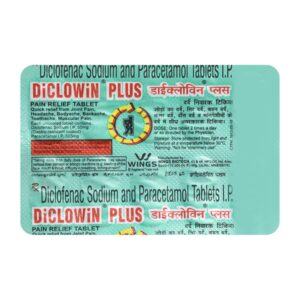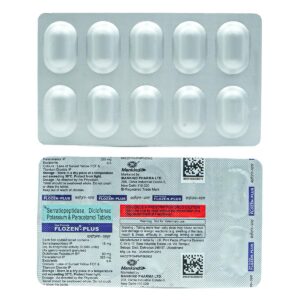DICLOFENAC + SERRATIOPEPTIDASE + PARACETAMOL
Diclofenac: Diclofenac is a nonsteroidal anti-inflammatory drug (NSAID) commonly used to relieve pain and reduce inflammation in conditions like arthritis, muscle strains, and menstrual cramps.
It works by inhibiting the production of certain chemicals in the body known as prostaglandins. These chemicals are responsible for inflammation, pain, and fever. By blocking their production, diclofenac helps to alleviate pain and reduce swelling.
Diclofenac is available in several formulations, including oral tablets, capsules, topical gel, and patches. The dose and frequency of diclofenac depend on the specific condition being treated and the formulation used.
For adults, the usual oral dose of diclofenac ranges from 50 to 100 mg two to three times a day. However, the dosages may vary based on the severity of the condition and individual patient factors. It is important to follow the instructions provided by your healthcare professional or the package insert.
As with any medication, diclofenac may cause side effects. Common side effects include stomach upset, indigestion, nausea, diarrhea, and headache. It may also increase the risk of stomach ulcers, bleeding, and kidney problems in some individuals.
Serious side effects are rare but can include severe allergic reactions, chest pain, difficulty breathing, swelling of the face or throat, black or bloody stools, and signs of liver or kidney problems. If any of these symptoms occur, it is important to seek immediate medical attention.
Diclofenac is contraindicated in individuals with a history of hypersensitivity to NSAIDs, asthma attacks, and severe heart failure. It should be used with caution in patients with gastrointestinal disorders, liver or kidney disease, and hypertension.
It is essential to discuss your medical history and any medications you are taking with your healthcare professional before starting diclofenac. They can better assess whether diclofenac is safe and appropriate for you.
Serratiopeptidase: Serratiopeptidase is an enzyme derived from a bacteria called Serratia marcescens. It is commonly used as a medication for its anti-inflammatory and anti-edematous properties.
Mechanism of Action: Serratiopeptidase works by breaking down proteins in the body, which can help reduce inflammation and swelling. It has been found to have fibrinolytic, anti-edematous, and analgesic effects. It can also improve the viscosity of secretions by breaking down mucus, making it useful in conditions such as chronic bronchitis and sinusitis.
Use: Serratiopeptidase is primarily used to treat conditions associated with inflammation, such as swollen joints, tissue swelling after surgery or injury, and sinusitis. It can also be used to reduce the viscosity of mucus in chronic respiratory conditions. Additionally, it is sometimes used as a complementary treatment for conditions like fibromyalgia and carpal tunnel syndrome.
Dose: The recommended dose of Serratiopeptidase can vary depending on the severity of the condition being treated. Generally, it is available in oral tablet form and a typical dose ranges from 5 to 30 milligrams per day. However, it is important to follow the specific instructions provided by your healthcare professional.
Side Effects: The use of Serratiopeptidase is generally safe, and side effects are rare. However, some individuals may experience digestive disturbances such as nausea, diarrhea, or stomach pain when using this medication. Allergic reactions are possible but uncommon. If you experience any unusual or severe reactions, it is important to seek medical attention immediately.
It is worth mentioning that Serratiopeptidase should be used with caution in individuals with bleeding disorders or those taking anticoagulant medications, as it may increase the risk of bleeding. Therefore, it is important to consult a healthcare professional before starting this medication, especially if you have any underlying medical conditions or are taking other medications.
Paracetamol: Paracetamol, also known as acetaminophen, is a commonly used medication for pain relief and reducing fever. It belongs to a class of drugs called analgesics and antipyretics.
Its primary use is to relieve mild to moderate pain caused by headaches, muscle aches, toothaches, menstrual cramps, and pain associated with colds and flu. It is also effective in reducing fever.
The exact mechanism of action of paracetamol is not fully understood, but it is believed to work by inhibiting the production of certain chemicals in the brain that are involved in pain and fever. Unlike nonsteroidal anti-inflammatory drugs (NSAIDs), such as ibuprofen or aspirin, paracetamol has little to no anti-inflammatory activity.
The typical dose of paracetamol for adults is 500-1000 mg every 4-6 hours, with a maximum daily dose of 4 grams. It is important to follow the recommended dosage instructions and not exceed the maximum daily limit to avoid potential liver damage.
Common side effects of paracetamol are rare when taken at the recommended doses. However, some individuals may experience mild gastrointestinal upset, such as nausea or stomach pain. In rare cases, an allergic reaction characterized by rash, itching, or swelling of the face, lips, or throat may occur. Very high doses or long-term abusive use of paracetamol can cause liver damage.
It is important to note that paracetamol may be found in combination with other medications, such as opioid painkillers or cold and flu remedies. It is essential to check the ingredients of these products to avoid accidental overdose of paracetamol.
As always, it is best to consult a healthcare professional or pharmacist before taking any medication to ensure it is the right choice for your specific condition and to discuss any potential interactions or contraindications with other medications you may be taking.


